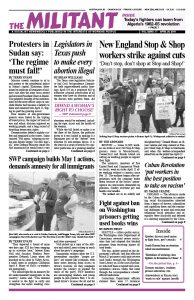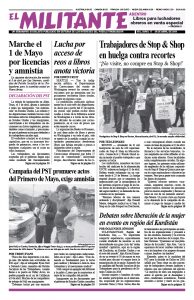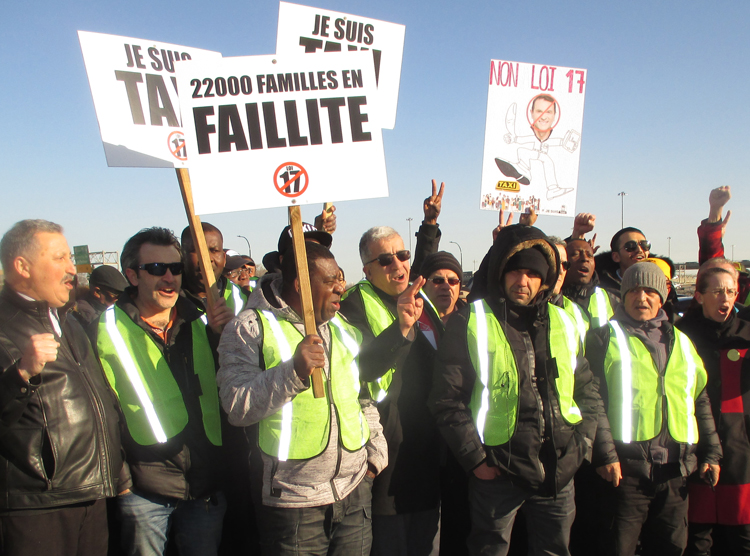MONTREAL — For weeks now, taxi drivers throughout the province have mounted protests in their thousands against the push by the Quebec government to deregulate the taxi industry. This would abolish the permit system, which restricts the number of cabs on the street and requires cab owners to purchase expensive permits. And it would permanently allow Uber and other app services to operate, setting the stage to pit the two sets of drivers against each other.
This sharply poses the need for all drivers here — Uber and taxi — to unite and fight together to build a joint union to defend themselves against the bosses and their government.
The conservative Coalition for the Future of Quebec (CAQ) government placed Bill 17 before the Quebec National Assembly March 20. The bill would establish a single set of regulations for both taxi and app company drivers, requiring only a standard driver’s license and minimal training.
Many taxi drivers are demanding that Bill 17 be scrapped. But if the permit system is ended, the drivers’ demand that the government compensate them in full for the value of their permits because they would become worthless. Most of them had been bought at sky-high prices.
Uber began operating in Quebec under the table in 2014. Starting in 2016, first the Liberal and then the CAQ governments allowed it to continue under a “pilot program.” They have pitted taxi and Uber drivers against each other as part of the government’s campaign to “modernize” the taxi industry.
Taxi driver Gerard Vancol told the Militant how he sees it is that “the government has chosen Uber over taxis.” While sitting in his cab at a bus terminal April 4 Vancol described what he faces. “I paid $200,000 for my permit and I still owe close to $100,000. The government is offering us $45,000,” he said. “The bank won’t care that I’ve lost my job and I still have to pay.”
“I agree the Uber drivers are victims too,” another taxi driver said to Communist League members when we talked at the beginning of their protest April 5 and told them about the California Uber drivers’ March 25 one-day strike against the bosses’ 25% cut in their mileage pay.
We also talked to Uber drivers in Montreal, giving them a copy of the Militant article reporting on the Uber strike, and raising the need for all drivers to form a common union to defend their interests against the bosses and the state.
“I work 60-70 hours a week and after Uber takes its 28% and all the other expenses I have, I don’t even make minimum wage,” one driver waiting at the CellParc at Trudeau airport told us. “The taxi drivers aren’t my enemy, but the taxi industry is. I don’t think it’s possible to ever get a union for Uber and taxi drivers.”
Under Quebec law both sets of drivers are deemed self-employed and barred from forming a union.
But without the fighting unity such a union would provide, drivers will founder against ongoing efforts by the bosses to pit them against each other to keep them all down.
The April 5 action paralyzed traffic in parts of Montreal and shut down the street when hundreds of drivers converged on the office of Transports Quebec. The protest was the first after a several-day pause in protest actions when taxi driver Martin LeBlond slashed one of his wrists on live TV March 29. “I don’t have anything to lose,” said LeBlond. He was taken to the hospital with injuries that were not life-threatening.
There are 7,600 taxi permits in Quebec and around 20,000 taxi drivers. Most drivers here rent cabs from the many big and small taxi company bosses who own the permits. There are some 10,000 Uber drivers in Quebec, including 5,000 in Montreal.
Taxi and Uber drivers need a union
The decadeslong quota permit system was never set up for the benefit of the taxi drivers. Limiting the number of permit holders kept the supply of cabs down and ensured higher profits for the bigger taxi company bosses.
Capitalism’s market forces transformed the permits — initially given out free — into expensive commodities and turned drivers into debt slaves by forcing them to mortgage their lives to the banks to buy the permits whose average cost in 2018 was $98,000. Before Uber came on the scene the permits were “worth” $200,000.
Some drivers bought permits as investments, hoping they could sell them later at a higher price, or at least without a loss, when they retired. They say that the $500 million promised by the government to compensate them all wouldn’t even come close.
The televised attempted suicide of LeBlond and reports in the media about the hardships facing taxi drivers has won a lot of sympathy among working people for their demand for full compensation for their permits. Solidarity with this fight by Uber drivers — and vice versa — is essential. And other workers and their unions need to help build the kind of taxi-Uber driver solidarity to strengthen the groundwork for their united fight for a union.
Katy LeRougetel and Michel Prairie contributed to this article.


